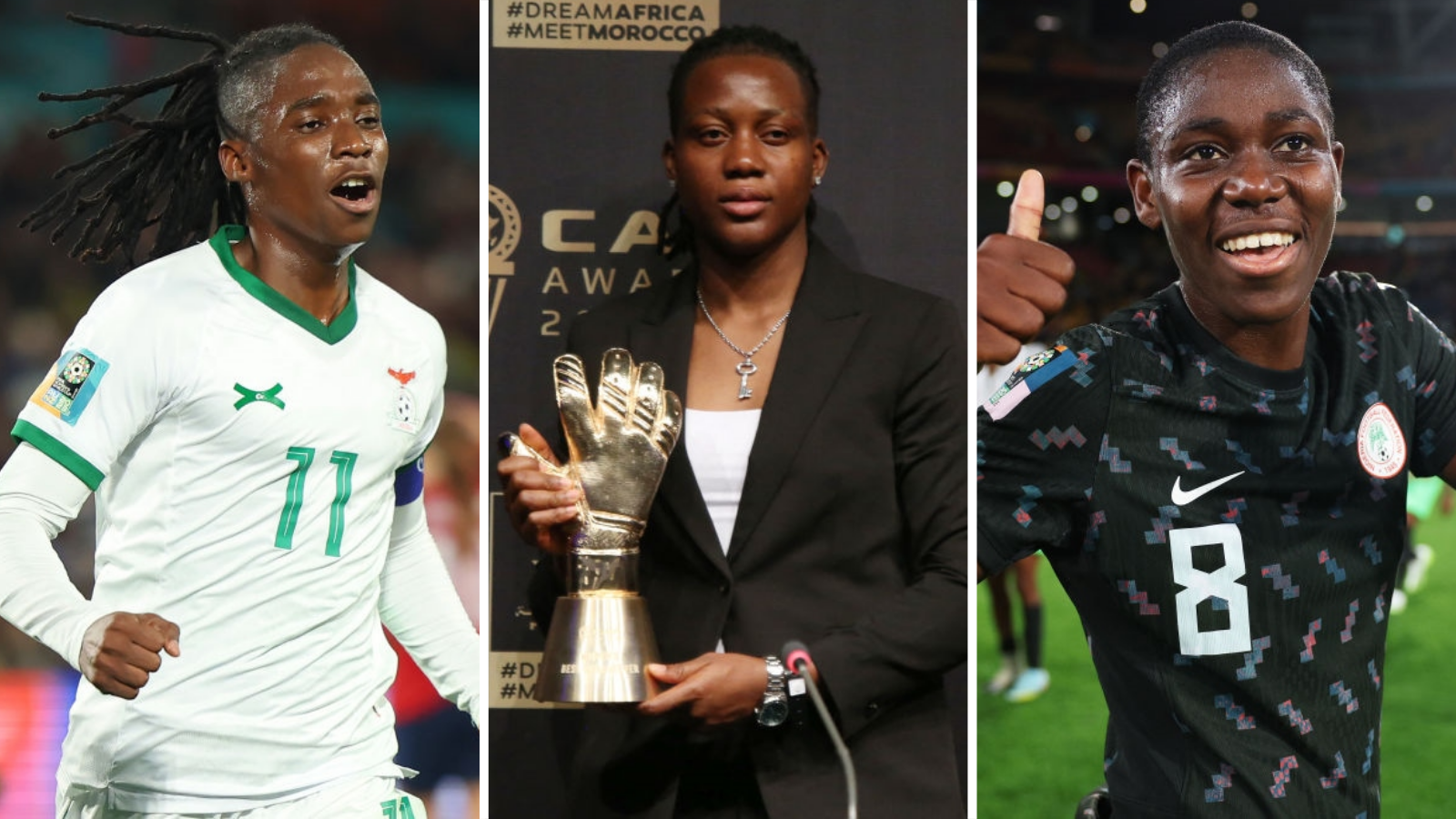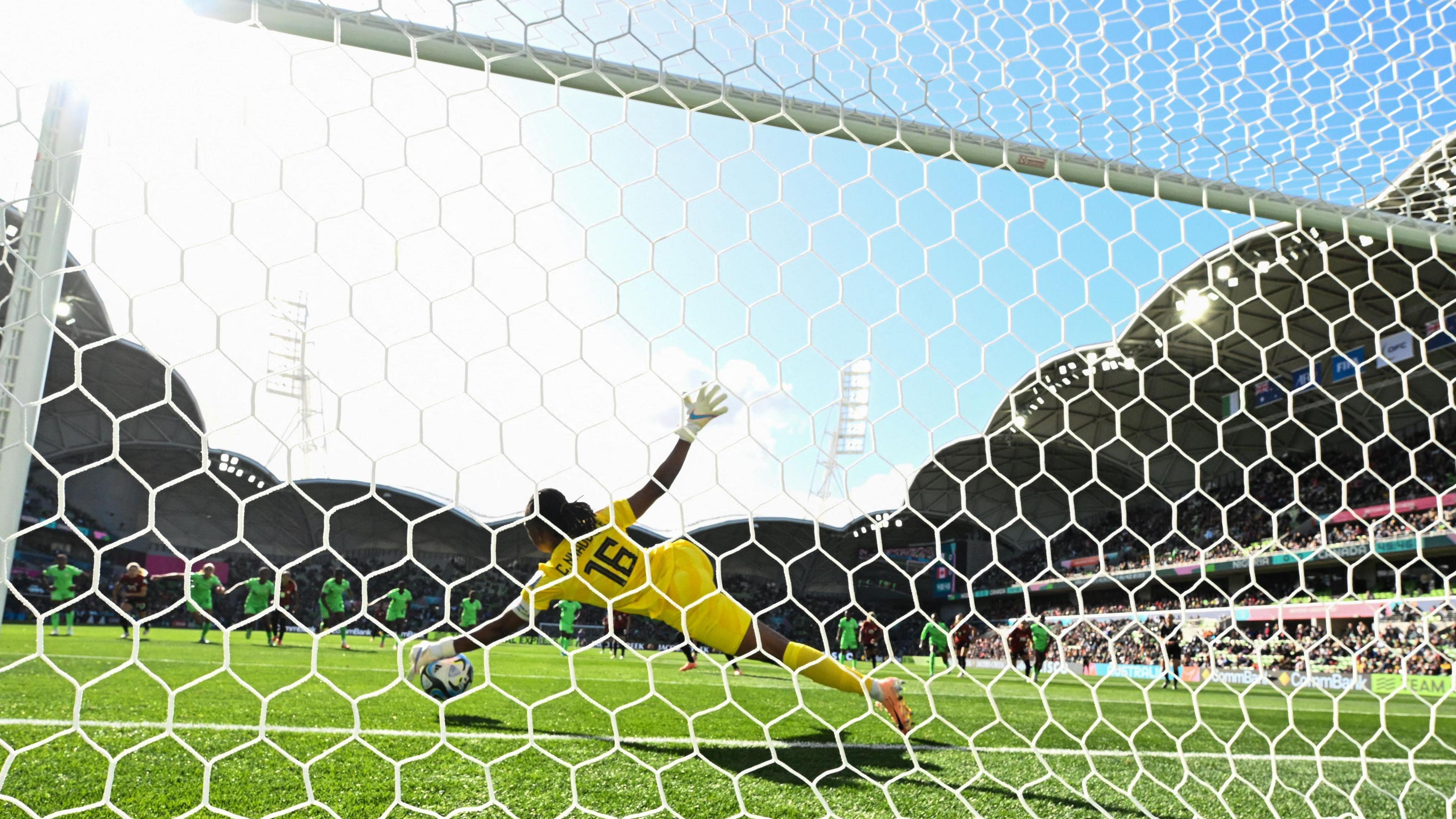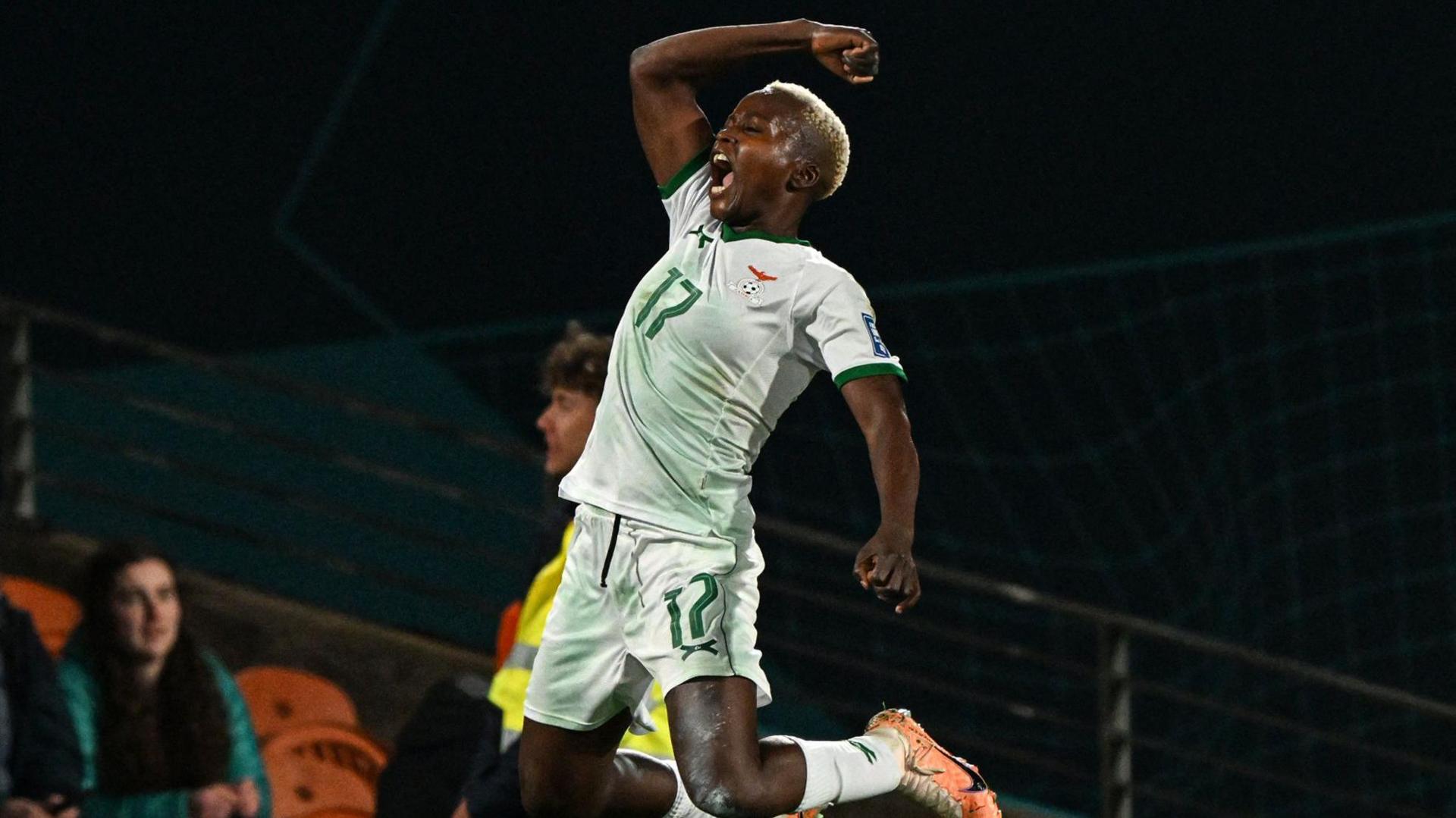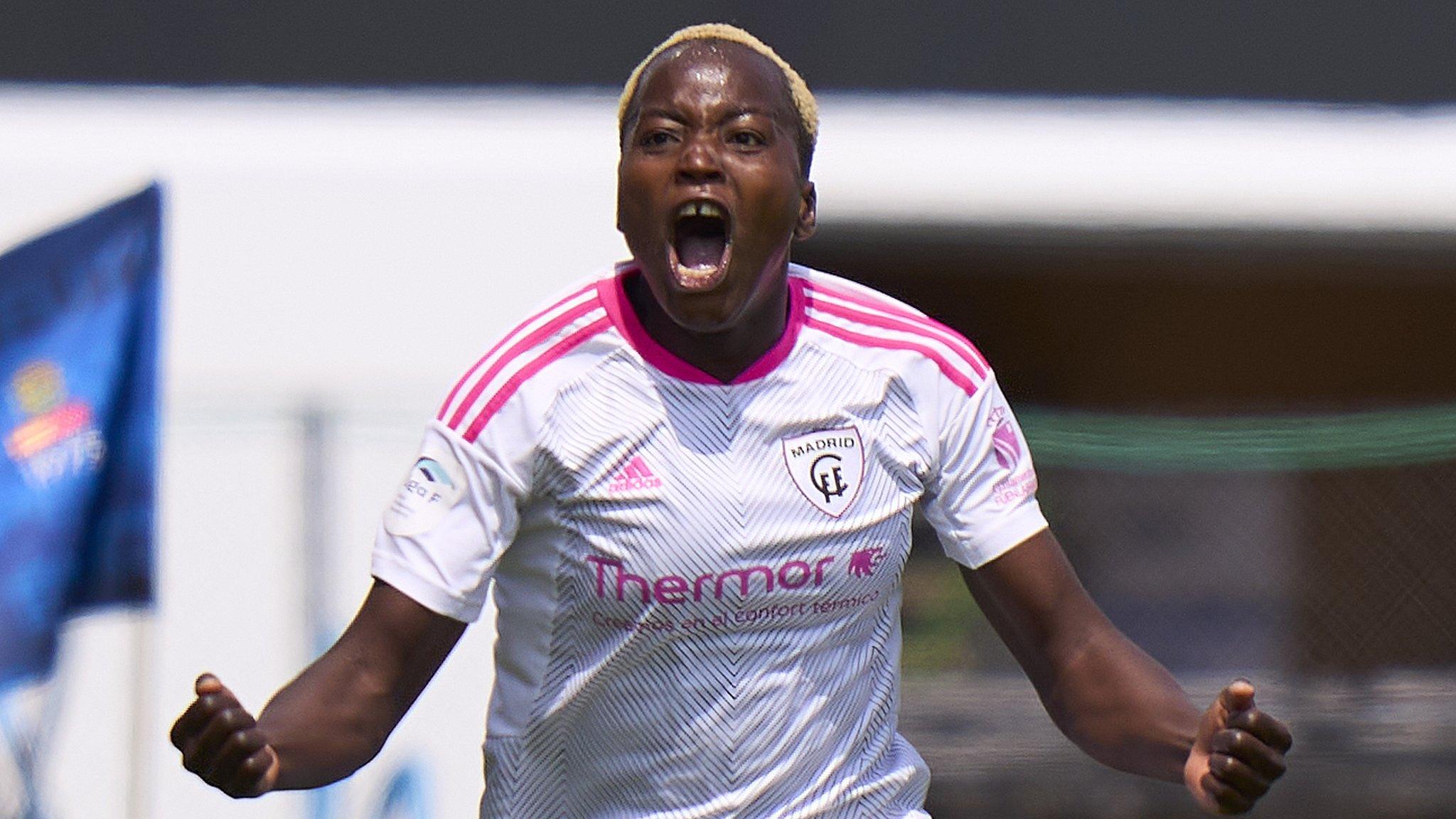Africa's footballers can do 'great things' at Paris 2024

Barbra Banda's Zambia and Nigeria, with goalkeeper Chiamaka Nnadozie named Africa's best in 2023 and star striker Asisat Oshoala, will represent the continent in France
- Published
Nearly three decades on from their male counterparts winning Olympic gold, Nigeria’s women’s football team believe it is their time to stun the world at this year’s Games in Paris.
Despite their remarkable record of having appeared at every Women’s World Cup, the Super Falcons are returning to the Olympics for the first time in 16 years.
One of just two African representatives, alongside Zambia, Nigeria head to France with confidence high.
“We are not just going there to participate, we can even win it – nothing is impossible,” goalkeeper Chiamaka Nnadozie, who plays her club football in the French capital, told BBC Sport Africa.
“We have everything it takes to go to the Olympics and get a gold medal. We have a better team now and we can do great things.”
Unlike the men’s Olympic tournament, which Africa has won twice through Nigeria in 1996 and then Cameroon four years later, no women’s side from the continent has ever gone further than the quarter-finals.
That was the Super Falcons themselves, who achieved the feat in Athens in 2004, losing to Germany in the last eight.
Nigeria and Zambia women seal final Olympic Games spots
- Published10 April 2024
Football at the Paris 2024 Olympics
- Published24 July 2024
This time it will be Zambia who meet the Germans, the 2016 Olympic gold medallists, as well as four-time champions the United States and Australia in Group B.
Nigeria have also been handed a daunting task, taking on reigning world champions Spain, Japan and Brazil, who have reached a total of three Olympic and World Cup finals, in a formidable Group C.
The Super Falcons reached the World Cup knockout stage for only the third time last year, suffering penalty shootout heartbreak against eventual runners-up England, but Nnadozie believes the nine-time African champions are greatly improved under American coach Randy Waldrum.
“With the kind of football we are playing now, we are going to conquer the world soon," she added.
Saving grace

Nnadozie's penalty save to deny Canada forward Christine Sinclair proved key to Nigeria's fortunes at last year's Women's World Cup
If Nigeria are to create history, then Nnadozie will need to continue her recent fine form.
Since joining Paris FC in 2020 from serial Nigerian champions Rivers Angels, the shot-stopper has consistently demonstrated her prowess, becoming a force for both club and country.
While she shone at last year’s World Cup in Australia and New Zealand, the second she has contested despite being only 23, she was also exceptional in the Uefa Women’s Champions League in 2023-24, a competition in which she saved five penalties in eight games.
With her group-stage penalty save against Canada ultimately crucial in helping Nigeria progress at the World Cup, not to mention her three shootout saves in the victorious 2019 African Games final, Nnadozie clearly has a knack for stopping spot-kicks.
“There are a lot of secrets behind it,” she smiles, declining to give too much away.
“I use some techniques. You believe in yourself and it’s also about game reading.”
Former international team-mate Desire Oparanozie, who competed at three Women’s World Cups prior to retiring last year, believes the Olympics offer another chance for Nnadozie to show the world just how good African goalkeepers can be.
“If she continues to perform at the highest level, she will be among the best goalkeepers in the world – if not the best,” the 30-year-old told BBC Sport Africa.
“She’s a phenomenal player. Every game, she is consistent.”
The youngest goalkeeper to keep a clean sheet at the Women’s World Cup, which she achieved aged 18 in 2019, Nnadozie’s dependability saw her crowned the best goalkeeper in last season’s French top flight as Paris FC finished third.
“I feel very happy winning awards because I’ve been working hard. But the first goal is for my team to win, not an individual trophy.”
'Beacon of hope'

Zambia are set to line up with women's football's most expensive player, Racheal Kundananji, at the 2024 Olympic Games
Nearly two decades have passed since Nigeria's women last appeared in the Olympic football tournament.
With a storied legacy in African football and a tradition of nurturing talented players, their return offers a fresh opportunity for a new generation eager to excel and make up for lost time.
It could also enable some African stars to make decisive moves in their career, whether they be playing for Nigeria or Zambia.
Returning for their second straight finals, the Zambian squad is spearheaded by Barbra Banda, who starred at Tokyo 2020, and Racheal Kundananji, who became the world’s most expensive player when joining Banda in the United States earlier this year.
“We have so many African players abroad who are doing well,” said Nnadozie, reflecting on the progress of women’s football on the continent.
“We are like a beacon of hope to those in Africa.”
Yet while women’s football may be progressing at a rapid pace on the continent, the recent decision to delay this year’s Women’s Africa Cup of Nations (Wafcon) to 2025 has caused concern.
Given the Covid-enforced cancellation of the 2020 edition, it means there will have been just one Wafcon, the 2022 edition, in nearly seven years by the time the 2025 finals get under way.
“It's not right,” said Oparanozie. “I think it's going to put us 10 steps behind, and it's not good for women's football in Africa.
“In this present time and age, we shouldn't be talking about postponing the Women's Afcon. We may be growing, but the rate at which we're growing is not rapid enough.”
The lack of competitive international football means rivals on the continent are likely to be watching events in Paris with envy.
“It was a great thing for Nigeria to qualify for the Olympics after 16 years,” said Nnadozie.
“I've been dreaming of playing in the Olympics and not just qualifying, but making a mark to make the nation proud.”
Her stage awaits.
Related topics
- Published13 February 2024
